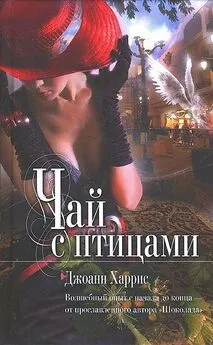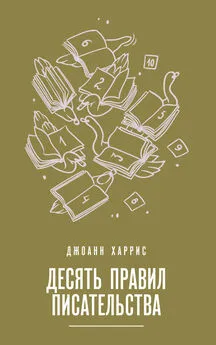Джоанн Харрис - Шоколад / Chocolat
- Название:Шоколад / Chocolat
- Автор:
- Жанр:
- Издательство:неизвестно
- Год:2021
- Город:Москва
- ISBN:978-5-04-117086-8
- Рейтинг:
- Избранное:Добавить в избранное
-
Отзывы:
-
Ваша оценка:
Джоанн Харрис - Шоколад / Chocolat краткое содержание
«Шоколад» – это история о доброте и терпимости, о противостоянии невинных соблазнов и закоснелой праведности. Одноименный голливудский фильм режиссера Лассе Халлстрёма (с Жюльетт Бинош, Джонни Деппом и Джуди Денч в главных ролях) был номинирован на «Оскар» в пяти категориях и на «Золотой глобус» – в четырех.
В формате PDF A4 сохранен издательский макет книги.
Шоколад / Chocolat - читать онлайн бесплатно ознакомительный отрывок
Интервал:
Закладка:
“For her age,” said Caroline.
“For any age,” I said.
“Well, I’m sure she seems so to a stranger,” said Caroline tightly. “But to her family…” She flashed me another of her cold smiles. “You have to understand that my mother is very old,” she explained. “Her mind isn’t what it used to be. Her grasp of reality-” She broke off with a nervous gesture. “I’m sure I don’t have to explain to you,” she said.
“No, you don’t,” I answered pleasantly. “It’s none of my business, after all.”
I saw her eyes narrow as she registered the barb. She may be bigoted, but she isn’t stupid.
“I mean…”
she floundered for a few moments. For a second I thought I saw a glint of humour in the boy’s eyes, though that might have been my imagination.
“I mean my mother doesn’t always know what’s best for her.” She was back in control again, her smile as lacquered as her hair. “This shop, for instance.”
I nodded encouragement.
“My mother is diabetic,” explained Caroline. “The doctor has warned her repeatedly to avoid sugar in her diet. She refuses to listen. She won’t accept treatment.” She glanced at her son with a kind of triumph. “Tell me, Madame Rocher, is that normal? Is that a normal way to behave?”
Her voice was rising again, becoming shrill and petulant. Her son looked vaguely embarrassed and glanced at his watch.
“Maman, I’ll be l-late.” His voice was neutral and polite. To me: “Excuse me, Madame, I have to get to s-school.”
“Here, have one of my special pralines. On the house:”
I held it out to him in a twist of Cellophane.
“My son doesn’t eat chocolate.” Caroline’s voice was sharp. “He’s hyperactive. Sickly. He knows it’s bad for him.”
I looked at the boy. He looked neither sickly nor hyperactive, merely bored and a little self-conscious.
“She thinks a great deal about you,” I told him. “Your grandmother. Maybe you could drop in and say hello one of these days. She’s one of my regulars.”
The bright eyes flickered for a moment from beneath the lank brown hair.
“Maybe.” The voice was unenthusiastic.
“My son doesn’t have time to hang about in sweetshops,” said Caroline loftily. “My son’s a gifted boy. He knows what he owes his parents.”
There was a kind of threat in what she said, a smug note of certainty. She turned to walk past Luc, who was already in the doorway, his satchel swinging.
“Luc.” My voice was low, persuasive. He turned again with some reluctance. I was reaching for him before I knew it, seeing past the polite blank face and seeing – seeing… “Did you like Rimbaud?” I spoke without thinking, my head reeling with images.
For a moment the boy looked guilty.
“What?”
“Rimbaud. She gave you a book of his poems for your birthday, didn’t she?”
“Y-yes.” The reply was almost inaudible. His eyes – they are a bright green-grey – lifted towards mine. I saw him give a tiny shake of his head, as if in warning. “I d-didn’t read them, though,” he said in a louder voice. “I’m not a f-fan of p-poetry.”
A dog-eared book, carefully hidden at the bottom of a clothes chest. A boy murmuring the lovely words to himself with a peculiar fierceness. Please come, I whispered silently. Please, for Armande’s sake.
Something in his eyes flickered.
“I have to go now.”
Caroline was waiting impatiently at the door.
“Please. Take these.”
I handed him the tiny packet of pralines. The boy has secret. I could feel them itching to escape. Deftly, keeping out of his mother’s line of vision he took the packet, smiled. I might almost have imagined the words he mouthed as he went.
“Tell her I’ll be there,” he whispered, “when Maman goes to the h-hairdresser’s.”
Then he was gone.
I told Armande about their visit when she came later today. She shook her head and rocked with laughter when I recounted my conversation with Caroline.
“He, he, he!” Ensconced in her sagging armchair, a cup of mocha in her delicate claw, she looked more like an apple-doll than ever. “My poor Caro. Doesn’t like to be reminded, does she?” She sipped the drink gleefully. Where does she get off, he?” she demanded with some testiness. “Telling you what I can and can’t have. Diabetic, am I? That’s what her doctor would like us all to think.” She grunted. “Well, I’m still alive, aren’t I? I’m careful. But that isn’t enough for them, no. They have to have control.” She shook her head. “That, poor boy. He stutters, did you notice that?”
I nodded.
“That’s his mother’s doing.” Armande was scornful. “If she’d left him alone – but no. Always correcting him. Always carrying on. Making him worse. Making out there’s something wrong with him all the time:” She made a sound of derision. “There’s nothing wrong with him that a good dose of living wouldn’t cure,” she declared stoutly. “Let him run awhile without worrying what would happen if he fell over. Let him loose. Let him breathe.”
I said that it was normal for a mother to be protective of her children.
Armande gave me one of her satirical glances.
“Is that what you call it?” she said. “The same way the mistletoe is protective of the apple tree?” She gave a cackle. “I used to have apple trees in my garden,” she told me. “Mistletoe got them all, one by one. Nasty little plant, doesn’t look like much, pretty berries, no strength of its own, but lord! Invasive!” She sipped again at her drink. “And poison to everything it touches.” She nodded to me knowingly. “That’s my Caro,” she said. “That’s her.”
I saw Guillaume again after lunch. He didn’t stop except to say hello, saying he was on his way to the newsagent for his papers. Guillaume is addicted to film magazines, although he never goes to the cinema, and every week he receives an entire parcel of them; Video and Cine-Club, Telerama and Film Express. His is the only satellite dish in the village, and in his sparse little house there is a widescreen television and a Toshiba video recorder wall-mounted above an entire bookcase of video cassettes. I noticed that he was carrying Charly again, the dog looking dull-eyed and listless on his master’s arm. Every few moments Guillaume stroked the dog’s head with the familiar gesture of tenderness and finality.
“How is he?” I asked at last.
“Oh, he has his good days,” said Guillaume. “There’s plenty of life in him yet.”
And they went on their way, the small dapper man clutching his sad brown dog as if his life depended upon it.
Josephine Muscat went by but did not stop. I was a little disappointed that she did not come in, for I’d been hoping to talk to her again, but she simply shot me a wild-eyed look as she passed; hands jammed deeply into her pockets. I noticed her face looked puffy, the eyes slitted closed, though it might have been against the gritty rain, the mouth zipped shut. A thick no-colour scarf bound her head like a bandage. I called to her, but she did not answer, quickening her step as if at some impending danger.
I shrugged and let her go. These things take time. Sometimes for ever.
Still, later, when Anouk was playing in Les Marauds and I had closed shop for the day, I found myself strolling down the Avenue des Francs Bourgeois in the direction of the Cafe de la Republique. It is a small, dingy place, soaped windows with an unchanging specialite du jour scrawled across, and a scruffy awning which reduces the available light still further. Inside, a couple of silent slot machines flank the round tables at which the few customers sit, moodily discussing matters of no importance over interminable demis and cafes-creme. There is the bland oily smell of microwaved food, and a pall of greasy cigarette smoke hangs over the room, even though no-one seems to be smoking. I noticed one of Caroline Clairmont’s hand-lettered yellow cards in a prominent position by the open door. A black crucifix hangs above it.
I looked in, hesitated, and entered. Muscat was at the bar. He eyed me as I walked in, his mouth stretching. Almost imperceptibly I saw his eyes flick to my legs, my breasts – whap-whap, lighting up like the dials on a slot-machine. He laid a hand on the pump, flexing one heavy forearm.
“What can I give you?”
“Cafe-cognac, please.”
The coffee came in a small brown cup with two wrapped sugar lumps. I took it to a table by the window. A couple of old men – one with the Legion d’honneur clipped to one frayed lapel – eyed me with suspicion.
“D’you want some company?” smirked Muscat from behind the bar. “It’s just that you look a little – lonely, sitting there on your own.”
“No, thank you,” I told him politely. “In fact, I thought I might see Josephine today. Is she here?”
Muscat looked at me sourly, his good humour gone. “Oh yes, your bosom friend.”
His voice was dry. “Well, you missed her. She just went upstairs to lie down. One of her sick headaches.” He began to polish a glass with peculiar ferocity. “Spends all afternoon shopping, then has to lie down in the bloody evening while I do the work.”
“Is she all right?”
He looked at me.
“Course she is.” His voice was sharp. “Why shouldn’t she be? If Her Bloody Ladyship could just get up off her fat arse once in a while we might even be able to keep this business afloat.” He dug his dishcloth-wrapped fist into the glass, grunting with the effort. “I mean.” He made an expressive gesture, “I mean, just look at this place.” He glanced at me as if about to say something else, then his gaze slid past me to the door. “He!” I gathered he was addressing someone just out of my field of vision. “Don’t you people listen? I’m closed!”
I heard a man’s voice say something indistinct in reply. Muscat gave his wide, cheerless grin.
“Can’t you idiots read?” Behind the bar he indicated the yellow twin of the card I had seen at the door. “Get lost, go on!”
I stood up to see what was happening. There were five people standing uncertainly at the cafe entrance, two men and three women. All five were strangers to me, unremarkable but for their air of indefinable otherness; the patched trousers, the workboots, the faded T-shirts which proclaimed them outsiders. I should know that look. I had it once. The man who had spoken had red hair and a green bandanna to keep it out of his face. His eyes were cautious, his tone carefully neutral.
“We’re not selling anything,” he explained. “We just want to get a couple of beers and some coffee. We’re not going to be any trouble.”
Muscat looked at him in contempt.
“I said, we’re closed.”
One of the women, a drab, thin girl with a pierced eyebrow, tugged at the redhead’s sleeve.
“It’s no good, Roux. We better – ”
“Wait a minute.” Roux shook her off impatiently. “I don’t understand. The lady who was here a moment ago your wife she was going to-”
“Screw my wife!” exclaimed Muscat shrilly. “My wife couldn’t find her arse with both hands and a pocket torch! It’s my name above the door, and I – say – we’re – closed!”
He had taken three steps from behind the bar, and now he stood barring the doorway, hands on hips, like an overweight gunslinger in a spaghetti western. I could see the yellowy gleam of his knuckles at his belt, hear the whistle of his breath. His face was congested with rage.
“Right.” Roux’s face was expressionless. He flicked a hostile, deliberate glance at the few customers scattered about the room. “Closed.”
Читать дальшеИнтервал:
Закладка:
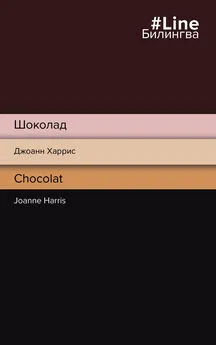
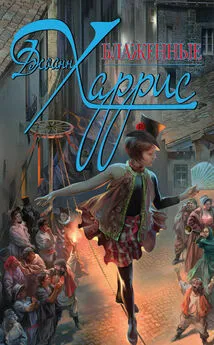
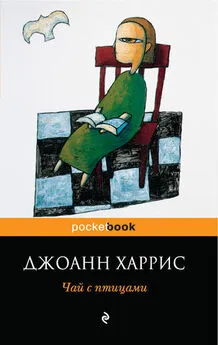
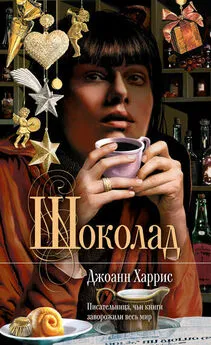
![Джоанн Харрис - Земляничный вор [litres]](/books/1072539/dzhoann-harris-zemlyanichnyj-vor-litres.webp)
![Джоанн Харрис - Джентльмены и игроки [litres]](/books/1087279/dzhoann-harris-dzhentlmeny-i-igroki-litres.webp)



